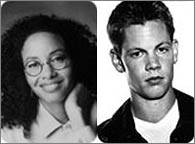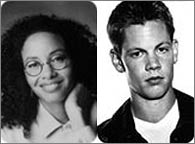Coming out means identifying as gay, lesbian, bisexual or transgender. The first person you have to reveal this to is yourself. After that, you can deal with friends and family. For many people, the coming out process is difficult. But most people come out because, sooner or later, they can't stand hiding who they are any more. Once they've come out, most people acknowledge that it feels much better to be open and honest than to conceal such an integral part of themselves.

Sometimes, the overwhelmingly heterosexual society we live in affects our ability to deal with the possibility of being gay, lesbian, bisexual or transgender. For Rice, the biggest hurdle in coming out was his own fear about being different. "I came to understand that one of the biggest hang-ups was me. I was convinced everybody would have a horrible reaction to my coming out. But my parents were wonderful � as were many others. Certainly, there was a wide spectrum of reactions � of highly tolerant to not very tolerant. But mostly, I was just projecting onto them my own insecurities."
Early on, in fact, Rice believed he was just going through a "phase." Throughout his teens, he went out with girls, and talked about eventually settling down with a woman. At the same time, he read books � portrayals of gay people leading real lives. And he continued talking with friends and thinking about his same-sex attractions. But when he had his first romantic involvement with a man, everything clicked.
"It really felt right � it felt natural. It felt more complete," recalls Rice. "And most of all, it felt too good to be something that I had to hide."
Understandably, it takes some time for many of us to reach the point where we feel comfortable enough about ourselves to share our discovery with others. But when we do take that step, our lives can change forever � most often, for the better. Before going away to college, Linda Villarosa was confused and unsure about her sexual orientation. One reason why she did not explore her feelings right away was because, at that time, she was trying to fit into a white neighborhood and didn't want to do anything others could think of as wrong. Finally, after she left for school, she took the step. "I came out because I couldn't stand not being myself any more."

Similarly, many transgender and transsexual people come out to be true to themselves. But it still can be quite dangerous for some people to have their transgender status revealed, says writer/activist Jamison Green. "It's necessary for transpeople to be comfortable enough about their difference that they can make appropriate disclosures to others."
What is important is your own comfort level � as well as awareness of your own safety in various circumstances, says Green, a transsexual man. "Not all transpeople need to come out all the time." It's also important to find your own comfort level about how you want to express your gender. "There is no one way to be transgendered," he says. "Some of us just want to alleviate our body/gender misalignment and experience life as 'ordinary' men or women, whether we are gay, straight or bisexual.
"I knew everyone would watch me change from androgynous to masculine, from woman to man, and some people would be disgusted, some frightened and some derisive," he recalls. "I was amazed how much support I received, and I know it was because I was clear and calm and understanding when others were confused. I had to spend a lot of time answering questions; I was very patient with people, and I know that made a difference for them."
And remember, you are never too old to come out. Each of us comes out at the age that feels best � as teens or retirees � or somewhere in between. Support networks and sources of information remain the same for all, although coming out at a later age may pose different challenges. Some people come out in middle age as they become more aware about how quickly their lives are passing, and the desire to find self-acceptance and happiness takes on greater urgency. You may have spent the first part of your life living up to other people's expectations of you. Now is the time to live up to your own expectations of yourself.











 打印版本
打印版本










读者回应
抢先发表第一个回应吧!
请先登入再使用此功能。